Filter by
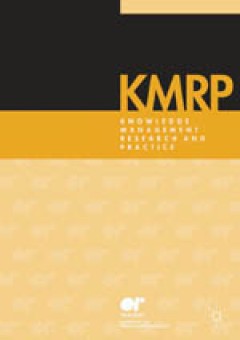
Making knowledge management work : tactical to practical
Over the past 20 years, many researchers and theorists have generated a significant body of literature in the interrelated fields of knowledge management (KM), organizational learning (OL), and knowledge creation (KC). A large body of work generated by proponents of technology as a primary facilitator of KM, OL, and KC supports the expenditure of billions of dollars in information technology in…
- Edition
- Vol. 9, No. 1, March 2011.pp. 84–94
- ISBN/ISSN
- 14778238
- Collation
- -
- Series Title
- Knowledge Management Research & Practice
- Call Number
- -
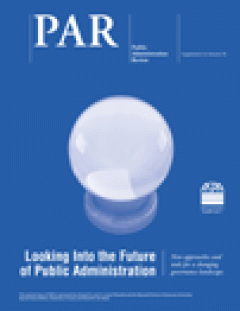
Practitioner's Perspective—Improving Sourcing Decisions
Federal departments and agencies increasingly rely on services to accomplish their missions. �Sourcing� refers to how government departments and agencies obtain the services they need to solve their mission delivery requirements and how those decisions are reached. Determining whether to obtain required services using federal employees or contracts with the private sector is an important legal,…
- Edition
- Vol 70, Issue Suppl s1, Dec 2010, pages s193–s200
- ISBN/ISSN
- 00333352
- Collation
- -
- Series Title
- Public Administration Review
- Call Number
- -

Strategic Management and Public Service Performance : The Way Ahead
Strategic management is now prominent on the agenda of public administration scholars and practitioners. In this review, the authors outline why approaches based on strategy are suited to public agencies, noting the ways in which strategy varies across public organizations, seeks to match internal capacities to organizational environments, and shapes the impact of external and internal constrai…
- Edition
- Vol 70, Issue Suppl s1, Dec 2010, pages s185–s192
- ISBN/ISSN
- 00333352
- Collation
- -
- Series Title
- Public Administration Review
- Call Number
- -
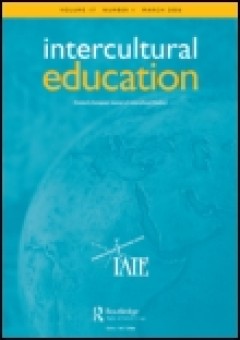
Indigenous studies and intercultural education : the impact of a place-based …
The article presents a student-impact assessment of a model two-year place-based intercultural approach to indigenous education. Students at Lewis & Clark Primary School in Missoula, Montana, connected face-to-face with tribal educators and members residing in the nearby American Indian reservation. The program's learning outcomes included impressive gains in knowledge of Montana tribes, fewer …
- Edition
- Volume 21, Issue 6, Dec 2010, Pages 597 - 606
- ISBN/ISSN
- 14675986
- Collation
- -
- Series Title
- Intercultural Education
- Call Number
- -

Multicultural awareness through English : a potential contribution of TESOL i…
The cultural diversity now evident in Greek society creates educational challenges and opportunities. Space to address these is provided by the multicultural awareness aspects of the discourse of the Cross-Thematic Curriculum Framework (CTCF). For English language classes, multicultural direction is provided through the disciplinary discussion of new teaching paradigm possibilities. In particul…
- Edition
- Volume 21, Issue 6, Dec 2010, Pages 581 - 595
- ISBN/ISSN
- 14675986
- Collation
- -
- Series Title
- Intercultural Education
- Call Number
- -

Whose knowledge is valued : a critical study of knowledge in elementary schoo…
This study critically examines knowledge in elementary school textbooks in China. Language analysis and story-line analysis are used to examine how the knowledge related to minority groups and how the knowledge related to the Han group are introduced and interpreted. This study finds that the Han knowledge dominates elementary school textbooks in China and that minority knowledge and culture ar…
- Edition
- Volume 21, Issue 6, Dec 2010, Pages 567 - 580
- ISBN/ISSN
- 14675986
- Collation
- -
- Series Title
- Intercultural Education
- Call Number
- -

Virtual journey coupled with face-to-face exchange : enhancing the cultural s…
This study attempted to enhance cultural sensitivity for graduate students at an American and a South African university, using a six-week online List Serv, email buddy exchange, and two-week face-to-face experience. After the course was over, results of the intercultural developmental inventory, using t-tests for related samples, showed that there was a significant difference (alpha equals .04…
- Edition
- Volume 21, Issue 6, Dec 2010, Pages 549 - 566
- ISBN/ISSN
- 14675986
- Collation
- -
- Series Title
- Intercultural Education
- Call Number
- -

Eux autres versus nous autres : adolescent students' views on the integration…
Focus group interviews with secondary school students in Quebec reveal assimilationist discourses concerning the integration of newcomers. The first part of the study involved interviews with immigrant students. In the second part of the study, reported here, host society youth describe fears of losing their cultural identity. Interview data indicate influences of exclusionist discourses from t…
- Edition
- Volume 21, Issue 6, Dec 2010, Pages 535 - 547
- ISBN/ISSN
- 14675986
- Collation
- -
- Series Title
- Intercultural Education
- Call Number
- -

Global culture, learning style, and outcome : an interdisciplinary empirical …
The study examined 2500 business degree students from 21 countries, enrolled at an Australian university, using a survey to assess learning style, which was integrated into a global culture taxonomy. The research hypothesis was that academic outcome could be explained through an interdisciplinary model, by integrating proven theories from educational psychology (learning style) and anthropology…
- Edition
- Volume 21, Issue 6, Dec 2010, Pages 519 - 533
- ISBN/ISSN
- 14675986
- Collation
- -
- Series Title
- Intercultural Education
- Call Number
- -

On the changing role of English language education : promoting respect for di…
This article argues for a more systematic and integrated approach to the cultural dimension within English language education in a globalized world, with the concept of culture taking on an affectively related and process-oriented meaning. To this end, it suggests an approach for the development of the ability to decenter from cultural norms and behavior that previously have been taken for gran…
- Edition
- Volume 21, Issue 6, Dec 2010, Pages 505 - 518
- ISBN/ISSN
- 14675986
- Collation
- -
- Series Title
- Intercultural Education
- Call Number
- -

Researching ethnic 'others' : conducting critical ethnographic research in Au…
In many parts of the world, classrooms are characterised by cultural and ethnic diversity. Increasingly, researchers are interested in exploring these rich and socially complex contexts. However, research into 'the ethnic other' can present complex ethical and methodological challenges. In this paper, the authors discuss, with reference to their respective studies in Australia and Scotland, the…
- Edition
- Volume 21, Issue 6, Dec 2010, Pages 493 - 503
- ISBN/ISSN
- 14675986
- Collation
- -
- Series Title
- Intercultural Education
- Call Number
- -
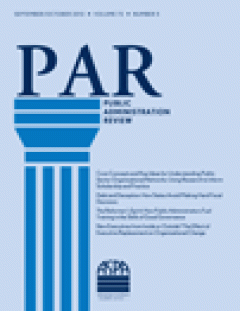
Toward “Strong Democracy” in Global Cities? Social Capital Building, Theo…
With faith in government waning, cultural diversity spiraling, and fiscal stress straining the ability of policy makers to address the policy challenges accompanying these developments, the salience of (re)connecting citizens with government takes on renewed urgency today. Nowhere is this more the case than in urban America, where so-called global cities teeming with ethnic diversity and contro…
- Edition
- -
- ISBN/ISSN
- 00333352
- Collation
- -
- Series Title
- -
- Call Number
- -
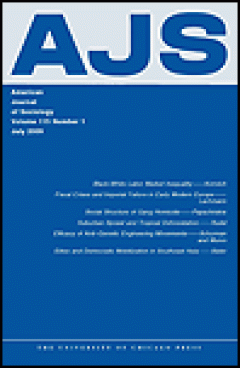
Getting Personal : Networks and Stratification in the Russian Labor Market, 1…
The authors use employment histories from survey data to examine personal network use and stratification in the Russian labor market from 1985 to 2001. Institutional changes associated with the Soviet collapse increased the use of networks and shaped their prevalence and benefits in theoretically coherent ways. In Russia, networks positively affect job quality, whether measured by occupation, c…
- Edition
- Vol. 116, No. 3, November 2010. pp. 855-908
- ISBN/ISSN
- 00029602
- Collation
- -
- Series Title
- American Journal of Sociology
- Call Number
- -

The Structure of Educational Decision Making and Consequences for Inequality …
Class differences in educational decision making are important for inequality. A unique Swedish population-level database of university applications and individuals� ranking of different programs is used to analyze class differences in preferences for different program characteristics. Compared to individuals from service class backgrounds, individuals from manual labor class backgrounds choose…
- Edition
- Vol. 116, No. 3, November 2010. pp. 806-854
- ISBN/ISSN
- 00029602
- Collation
- -
- Series Title
- American Journal of Sociology
- Call Number
- -

When Formal Laws and Informal Norms Collide : Lineage Networks versus Birth C…
Ancestor worship and bloodline continuation are the core norms of lineage in China. Beginning in the late 1970s, these cultural norms came into direct confrontation with the state birth control policy. Pitched against each other are the antinatalist laws backed by the powerful and unyielding state apparatus on the one side and the ancient pronatalist norms backed by revived lineage networks on …
- Edition
- Vol. 116, No. 3, November 2010. pp. 770-805
- ISBN/ISSN
- 00029602
- Collation
- -
- Series Title
- American journal of Sociology
- Call Number
- -

The Right to Difference : Explaining Colombia’s Shift from Color Blindness …
Drawing on archival analysis and in-depth interviews, this article examines Colombia�s adoption of policies for black Colombians in 1993. It argues that Afro-Colombian activists were able to seize upon changes in global policy norms around multiculturalism and state disequilibrium both by deploying traditional social movement strategies and by framing their demands in terms of ethnic difference…
- Edition
- Vol. 116, No. 3, November 2010. pp. 729-769
- ISBN/ISSN
- 00029602
- Collation
- -
- Series Title
- American Journal of Sociology
- Call Number
- -
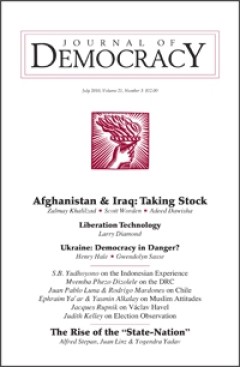
Two Essays on China’s Quest for Democracy
Imprisoned Chinese dissident Liu Xiaobo, who was awarded the 2010 Nobel Peace Prize, is best known for his eloquent and incisive essays. Two of them are featured here: �Can It Be That the Chinese People Deserve Only �Party-Led Democracy�?� and �Changing the Regime by Changing Society.�
- Edition
- Volume 22, Number 1, January 2011.pp. 152-166
- ISBN/ISSN
- 10455736
- Collation
- -
- Series Title
- Journal of Democracy
- Call Number
- -

Determining the informational, navigational, and transactional intent of Web …
In this paper, we define and present a comprehensive classification of user intent for Web searching. The classification consists of three hierarchical levels of informational, navigational, and transactional intent. After deriving attributes of each, we then developed a software application that automatically classified queries using a Web search engine log of over a million and a half q…
- Edition
- Vol. 44, No. 3, Page 1251-1266
- ISBN/ISSN
- 0306-4573
- Collation
- -
- Series Title
- Information Processing & Management
- Call Number
- -

Junior researchers’ experience of innovation in a multidisciplinary team en…
This paper describes junior researchers� experience of innovative research, with the aim of encouraging fellow junior academics. Through the experience, the team recognised that context and flexibility are key factors in the research process. These factors are discussed in the light of three specific features of this project. First is the type of research the team engages in: meta-research, whi…
- Edition
- Vol. 9, No. 2, March 2011.pp.95–97
- ISBN/ISSN
- 14778238
- Collation
- -
- Series Title
- Knowledge Management Research & Practice
- Call Number
- -

Reflections on the Spirit and Work of the U.S. Advisory Commission on Intergo…
What did the U.S. Advisory Commission on Intergovernmental Relations (ACIR) accomplish before it was disbanded in 1996? Were its accomplishments sufficiently valuable to justify reestablishing the organization? This article reviews the commission�s origins, history, and accomplishments, and addresses future intergovernmental needs. The ACIR�s accomplishments were substantial, but are largely un…
- Edition
- Vol. 71, Issue 2, March/April 2011. pages 161–168
- ISBN/ISSN
- 00333352
- Collation
- -
- Series Title
- Public Administration Review
- Call Number
- -
 Computer Science, Information & General Works
Computer Science, Information & General Works  Philosophy & Psychology
Philosophy & Psychology  Religion
Religion  Social Sciences
Social Sciences  Language
Language  Pure Science
Pure Science  Applied Sciences
Applied Sciences  Art & Recreation
Art & Recreation  Literature
Literature  History & Geography
History & Geography